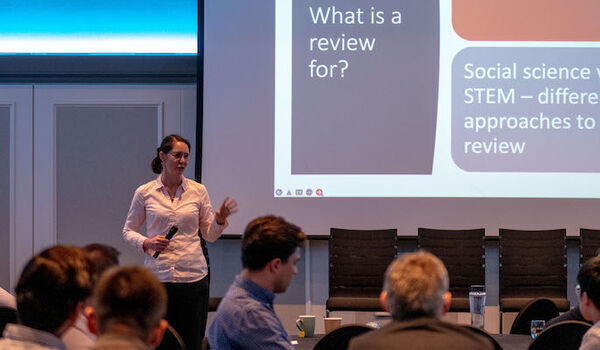Why you should review papers early on in your academic career
- Workplace Behaviour Research Centre

When you’re coming to the end of your PhD and you start to turn your attention to writing journal articles, you may feel like you only have the time and energy to focus on drafting your own paper and start sending it to journals. There is a lot to be gained from becoming a reviewer, however, and the experience can really help improve your own research and publishing skills.
As the publishing process can be quite brutal (for many journals 30-35% of papers are rejected at the first pass and ultimately around 95% are rejected) you should embrace any opportunity to improve the chances of your paper being accepted.
Becoming a reviewer helps you improve your research because it allows you to:
- Stay on top of the latest findings in your field
- Learn about new and related topics without having to go through the hard work of doing the literature review yourself
- See how other people collect and analyse their data – there may be methods that you can use.
And, not only that, it helps you to get your papers published because you can:
- Understand what editors are looking for
- Identify common mistakes that reviewers and editors always pick up on
- Learn tips and tricks from other authors – look at the structure of the paper, phrases that are used to help guide reviewers toward a positive decision, clever ways of dealing with limitations and so on.
Here’s my advice on how to make reviewing papers work for you:
- Accept as many opportunities to review early in your career as you can (although avoid any dodgy ones where you are asked to pay to review or that you can’t find much information about).
- Use each paper you review as a tool to learn from. Write notes for yourself as well as notes for the review itself.
- Identify what you’re looking for in the manuscript. When you’re starting to review, you might want to create a list of things to check in the manuscript using the journal’s guides as a foundation.
- Experiment with different processes until you find one that enables you to be efficient but in-depth. I like to read the paper and scribble comments all over it on one day and then write the review up on another day; while others like to set aside an afternoon and do it all at once. There’s no one right way to work on a review!
- When the decision letter goes out to the authors, you will get a copy of it. Read it carefully and look at what the Associate Editor picked up on out of all the reviewers’ comments. You can learn from the decision letter as much as you can from the reviewing itself.
- At the bottom of the decision letter will be the other reviewers’ comments. Make sure you read these carefully as well to see where you identified the same issues and where you identified different ones. See how the other reviewers structured their comments and what you can learn from them.
- When submitting your review to the journal check if they use Publons – a tool to track the papers you review. If they do, make sure you tick the box so it can be added to your CV.
To become a reviewer, find journals in your area that you’d like to review. Look at who the Associate Editors are and contact them directly or contact the Managing Editor with your details and expertise.
As well as learning from the reviewing process and having something else to add to your CV, reviewing papers can be one of the most enjoyable parts of the job. Don’t be overwhelmed or disheartened at the start – like anything, it becomes easier and quicker the more practice you get!
Professor Kerrie Unsworth was part of a panel discussion for the Leeds University Business School’s doctoral research conference earlier this month (June 2022), speaking to our postgraduate researchers about the reviewing process.
Contact us
If you would like to get in touch regarding any of these blog entries, or are interested in contributing to the blog, please contact:
Email: research.lubs@leeds.ac.ukPhone: +44 (0)113 343 8754
Click here to view our privacy statement. You can repost this blog article, following the terms listed under the Creative Commons Attribution-NonCommercial-NoDerivatives 4.0 International licence.
The views expressed in this article are those of the author and may not reflect the views of Leeds University Business School or the University of Leeds.

